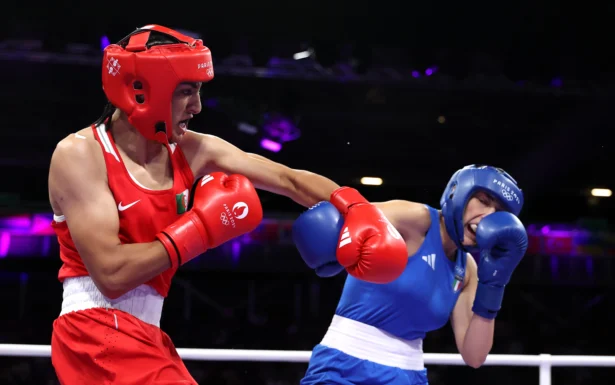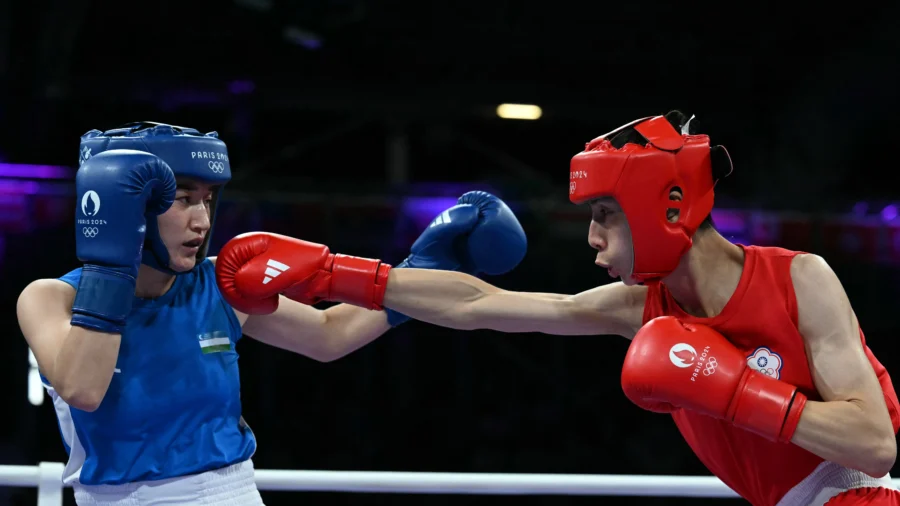Lin Yu-Ting, a Taiwanese boxer previously banned from competing in a women’s event after failing to meet gender eligibility criteria, easily won against Uzbekistan’s Sitora Turdibekova of the women’s 57-kilogram division in a round of 16 match.
The 28-year-old defeated Turdibekova in a unanimous 5–0 points decision on Aug. 2. The three-time world championship medalist now advances to face Bulgaria’s Svetlana Staneva in the quarterfinals on Aug. 4.
According to BoxRec, the official record keeper for combat sports, Lin has a career record of 41 wins and 14 losses and is the top seed in the women’s 57-kilogram category.
The athlete is well-known in international competitions for being taller and leaner than most other competitors in the division.
Turdibekova, meanwhile, has seven wins and nine losses, her records show. She was pictured crying in the ring before walking to the dressing room in tears next to her coach.
Eligibility Dispute
Lin is one of two boxers cleared to compete in the Paris Olympics women’s division by the International Olympic Committee (IOC) despite previously failing gender eligibility tests.
Imane Khelif and Lin were disqualified from the 2023 International Boxing Association (IBA) Women’s World Boxing Championships after failing IBA eligibility rules that prevent athletes with XY chromosomes, which typically indicate they are male, from competing in women’s events.
The IOC—which applies different eligibility criteria than the IBA—is running the boxing competition in Paris after it stripped the IBA’s status as the global governing body for boxing in June 2023 over problems related to governance, finance, and ethics.
Khelif won the women’s 66-kilogram division opening match on Aug. 1 against Angela Carini after the Italian abandoned the fight when she said she felt “a strong pain” in her nose following her Algerian adversary’s opening punches.

The 25-year-old’s victory sparked much outcry about the IOC’s eligibility regulations, including from Italian Prime Minister Giorgia Meloni and prominent figures such as “Harry Potter” author J.K. Rowling and Tesla CEO Elon Musk.
“I think that athletes who have male genetic characteristics should not be admitted to women’s competitions,” Meloni said during a news conference on Aug. 1.
IOC Defends Eligibility Rules
The IOC and Paris 2024 Boxing Unit defended their position to include both boxers in a joint statement on Aug. 1, saying the two athletes had been competing in the women’s category for many years. They also clarified that gender classification is based on their passports.
“All athletes participating in the boxing tournament of the Olympic Games Paris 2024 comply with the competition’s eligibility and entry regulations, as well as all applicable medical regulations set by the Paris 2024 Boxing Unit,” the statement reads. “As with previous Olympic boxing competitions, the gender and age of the athletes are based on their passport.”
The sports organizations also said some media reports are “misleading,” saying the IBA disqualified both boxers “without any due process” in a decision that was “initially taken solely by the IBA Secretary General and CEO.”
“The current aggression against these two athletes is based entirely on this arbitrary decision, which was taken without any proper procedure—especially considering that these athletes had been competing in top-level competition for many years,” the statement added.
Responding to the IOC, the IBA stressed that it “stands by its position,” explaining the disqualification was “based on two trustworthy tests conducted on both athletes in two independent laboratories.”
The specifics of the tests “remain confidential,” the IBA said. It noted both athletes were subject to “a recognized test” at the 2022 and 2023 world championships which led to the association’s conclusion that both boxers had “competitive advantages over other female competitors.”
“We absolutely do not understand why any organisation would put a boxer at risk with what could bring a potential serious injury within the ‘Field of Play,'” the IBA said in a statement on Aug. 1.
“The IBA will never support any boxing bouts between the genders, as the organization puts the safety and well-being of our athletes first. We are protecting our women and their rights to compete in the ring against equal rivals, and we will defend and support them in all instances,” it added.
Other Competitors Comment
Views on Khelif’s and Lin’s inclusion in the Paris Olympics have varied among fighters.
Australia’s Marissa Williamson Pohlman, who lost to Khelif in the Netherlands in May 2023, said the Algerian boxer was particularly strong when they previously fought.
“I did notice it, but you just keep fighting, though, don’t you?” she said. “It’s just a part of the sport. All you want to do is win, so you just keep chucking punches.”
Hungary’s Luca Anna Hamori, who will face Khelif in the quarterfinals on Aug. 3, expressed no fear when asked about her upcoming fight.
“I’m not scared,” Hamori said. “I don’t care about the press story and social media.”
Amy Broadhurst, an Irish amateur boxer who beat Khelif in the 2022 IBA Women’s World Championships, said on social media that she thinks Khelif was born with “differences in sex development” (DSDs).
According to the National Health Service website, DSDs are a group of rare conditions involving genes, hormones, and reproductive organs. It means a person with DSDs is raised as female but has the male XY sex chromosomes and male blood testosterone levels.
“Personally, I don’t think she has done anything to ‘cheat,'” Broadhurst wrote on her Instagram stories. “I [think] it’s the way she was born & that’s out of her control. The fact that she has been [beaten] by 9 females before says it all.”
Neither Khelif nor Lin has addressed the gender controversy publicly.
The Associated Press contributed to this report.

